Time and money are always the two biggest concerns when traveling. When there’s enough of one, there usually seems to be a shortage of the other. When you find a place that you love but have to leave quickly due to a lack of either, it can be a huge bummer. There’s one place in particular where this happens to many – Bali. What if I told you that there was a way to stay in Indonesia for a year without visa worries and get paid? The Darmasiswa program is your ticket, and applications are open right now for the 2018-19 school year.
About the Darmasiswa Program
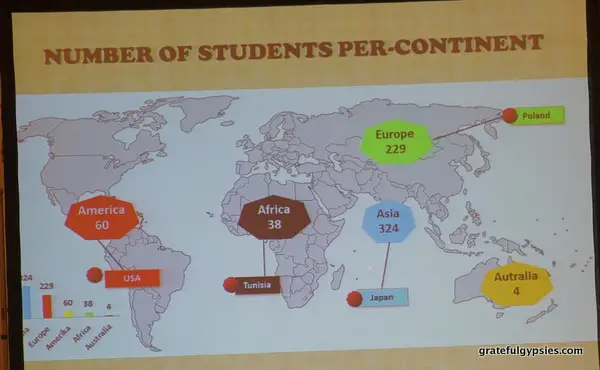
Darmasiswa has been going on every year since 1974. It’s run by the Ministry of Education and Culture in cooperation with the Ministry of Foreign Affairs. There are 54 universities across the country – mostly in Sumatra, Java, and Bali – which are a part of the program.
Most schools focus on Bahasa Indonesia, but there are quite a few that focus on the arts and culture – batik painting, puppetry, traditional dance, and music. The program lasts for one school year, and it’s open to people from all countries that have diplomatic relations with Indonesia. In recent years, there have been nearly 800 participants from over 80 countries.
As a participant in Darmasiswa, you receive free tuition, a year-long visa, and a monthly stipend to offset some of the costs of living. How much you get depends on where you study, as they have organized the stipend into two groups. Those in bigger cities like Jakarta, Bandung, or Denpasar will receive 2.95 million Rupiah (~$220) per month. Those in smaller cities such as Yogyakarta or Medan will get 2.55 million (~$190).
You don’t receive a degree for the program – it’s simply meant for cultural exchange. For those with a genuine interest in the language and culture of Indonesia, this program is a great way to stay in the country for a while. Tourist visas only give you 30 days in the country – not nearly enough to really dive in.
Darmasiswa Program Requirements
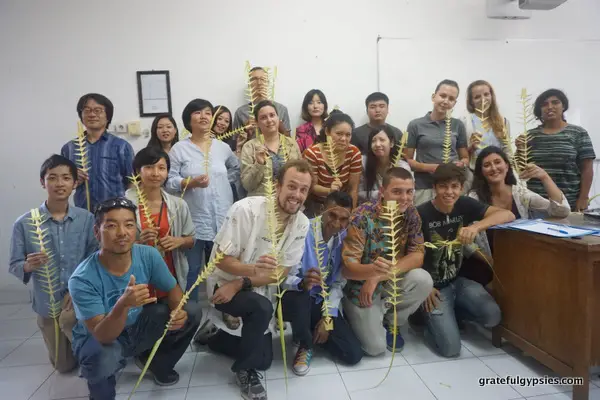
There aren’t a whole lot of requirements for applying to this program. As previously mentioned, you need to be from a country that has diplomatic relations with Indonesia (most people fall into this category). In addition, the program’s website lists these requirements:
- Preferably student
- Completed secondary education or its equivalent
- Minimum age 17 years and not older than 35 years of age
- Able to communicate in English and additional Bahasa Indonesia, proven by English Language Proficiency Certificate: TOEFL/TOEIC/IELTS or OTHER CERTIFICATE if applicable (language certificate is not a mandatory)
- In good health as proven by Medical Certificate (medical checkup result)
- Unmarried
- Have basic knowledge of the field you’re applying to
While the age requirement is definitely enforced, the others don’t seem to be. I had classmates who hadn’t attended university yet, some who spoke little to no English, and most had zero Indonesian before joining the program. Basically, as long as you’re under 35, you can probably go ahead and apply if you’re interested.
How to Apply for the Darmasiswa Program
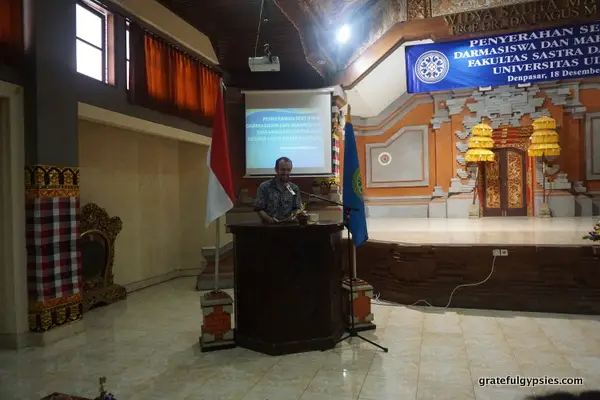
You need to apply for the program through your resident Indonesian embassy or consulate. As a resident of Michigan, I had to process my application through the consulate office in Chicago. Make sure you confirm which office you need to apply through before starting the process. Once you’re ready, you’ll need:
- Curriculum vitae/resume
- Medical certificate
- A valid passport
- Recommendation letter from education institution /professional institution on official letterhead and signature (in English)
- Last academic transcript and certificates (in English)
- Language certificate (if applicable)
- Other certificates related to the field you’re applying for (if applicable)
- Written essay about purpose of study (in English or Bahasa Indonesia, maximum 500 words)
You may not need all of those things, but it’s better to be safe than sorry. The health certificate can be a basic physical exam (I had my dad do it, as he’s a doctor).
As for reference letters, it doesn’t seem as if they’re absolutely essential, but they probably don’t hurt. I got one from a former professor who mentioned that I was a good student and she knew I had a legitimate interest in studying language & culture.
The letter of intent is where you can really make yourself stand out. I spent a lot of time on my letter, and I’m sure it had quite a bit to do with why I ended up getting Bali – the top choice by far.
Darmasiswa Classes
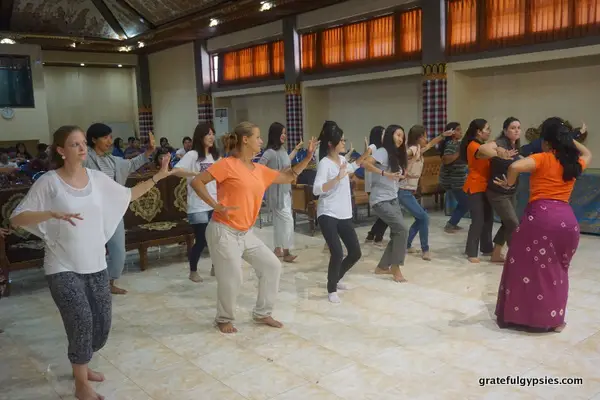
Depending on your place of study and the program you end up in, your schedule could be quite different. Some schools have classes five days a week, while others (like mine) only have four. All schools across the country will take national holidays off. In Bali, however, there are also lots of surprise holidays for ceremonies, which happen quite frequently. Even if you do have a full week of classes it’ll only add up to 15-20 hours total, leaving you plenty of time for whatever else you want to do.
A common complaint across the whole spectrum of the program is that the classes aren’t very serious – teachers show up late (or not at all), there isn’t much structure to the lessons, and you aren’t pushed very hard at all. Truth be told, if you really want to get a lot out of your stay here in an academic sense, you’re going to have to look elsewhere.
For example, some friends of mine who studied at the art school found their classes to be somewhat of a joke. As such, they joined in a gamelan (traditional Balinese music) group outside of school that met 3-4 times a week. Others chose to hire private tutors or study the language on their own. Some gave up entirely and spent a majority of their time surfing and drinking beer.
It’s entirely up to you how you spend your time here and what you get out of it. Nobody is going to push you to come to class, to study, or to complete assignments.
Should You Join the Program?
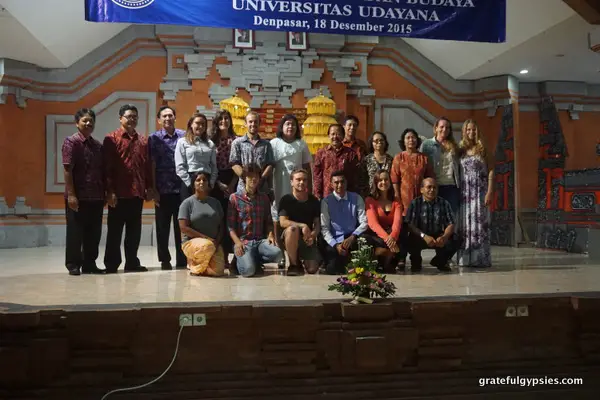
If you’re considering applying for the program next year, you’ll probably want to ask yourself a few questions:
Am I ready to commit to the full year?
If you think you might only do half of the year, then please don’t apply – you’re taking a spot away from someone who might really want to do the whole thing.
Am I prepared for the inevitable culture shock that will come?
If you’re American and going to Canada makes you uneasy, then Indonesia is probably going to be too much for you. If you’ve already lived abroad and/or traveled extensively, you’re more likely to succeed.
Do I have money saved? Or am I going to have to live off the stipend?
As I mentioned, the stipend is between 2.5-2.95 million Rupiah/month, or about $200. While there are plenty of locals who live off of less, chances are that’s going to be tough for you. Based on my experience, I would recommend having at least $500 saved for every month you’ll be here.
What do I hope to do with my time there?
Now that you have a better idea of what to expect, you have to think about this one carefully. Chances are your classes will be a bit of a letdown. Even if you go to them all you’ll still have loads of free time. You’re not supposed to work, and it’s damn near impossible to do so in Bali even if you wanted to. So what are you going to do with yourself? The surplus of free time is a blessing to some and a curse to others. Think about this carefully before applying.
My Experience
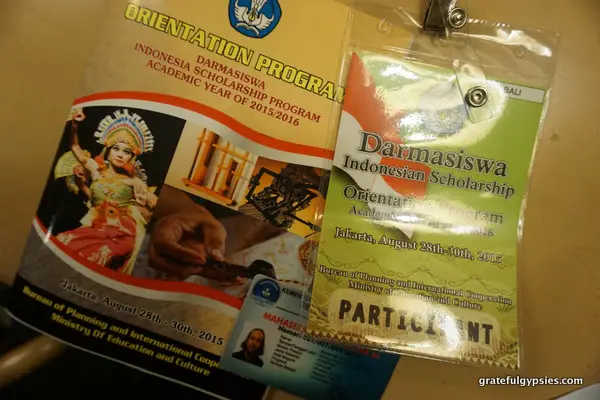
Overall, I had a great time in the program and would highly recommend it. However, it’s important to note that there are a variety of factors that affected my experience as compared to others who didn’t have such a good time:
- It was my third time in Indonesia, as I previously visited in 2012 and 2014.
- I’d already been living in Asia for over 5 years, working as a teacher and blogger in China.
- We had a friend do Darmasiswa previously, visited him when he was here, and knew what to expect.
- I do freelance work for a company at home and thus continued to earn an income above and beyond the stipend.
- I studied a bit of Indonesian before joining the program, as I took a week of private lessons last year while visiting Yogyakarta.
Living in Bali has its ups and downs just like anywhere. Many think of Bali as some sort of paradise, and in many ways, it is. On the other hand, you’ll see the other, darker sides of the island while living here – terrible traffic, rampant overdevelopment, blatant price gouging against foreigners, etc.
For the most part, I quite enjoyed living there. Once again, that probably has a lot to do with the factors mentioned above.
The program definitely leaves a lot to be desired. As a language teacher, I can’t help but look at the classes and think about how it could be better with a few minor changes. That being said, I made an effort to attend at least 2-3 days a week, study a bit on my own, and speak the language outside of class.
My Indonesian isn’t great, but I was asked to give a speech at the closing ceremony, so it’s at a decent level.
Final Thoughts

Obviously, not everyone in Darmasiswa will have the same experience. It very much depends on the type of person you are, whether or not you’re comfortable living in a foreign country, and of course which city and school you end up in.
Someone who’s never been out of their home country for more than a few weeks will most likely have a harder time adjusting to the inevitable culture shock. Those studying in Jakarta will definitely have a different experience than those in Bali. Someone in a school where it’s more of a vacation for everyone may get more frustrated and feel as if they’re wasting time compared with someone who ends up in a more serious school (if there is one).
Quite a few people I met in Bali gave up on the whole thing and went home for a variety of reasons – homesickness, frustration, boredom, and lack of money. It’s important to take these things into consideration before applying.
Looking back on it, I can definitely recommend the program to the right type of person. Sure, the classes may be a bit of a joke, but it’s still a great experience.
You get to live in one of the most interesting countries in the world, meet people from all over, have lots of free time, and get paid to study a few hours a week. At the very least, it’s an interesting experience and something that will make you stand out in the future when you’re applying for schools or jobs.
Video
Need some more convincing? Check out this short video I put together that gives you a glimpse into what life is like in the Darmasiswa program:
Participating in the program and living in Bali for a year has been a highlight of my 32 years on Earth and I’m happy to help others get there. I’ve traveled a lot in the past decade and have visited many amazing places, but Indonesia holds a special place in my heart. Do yourself a favor and apply for the program and get yourself a year in this fascinating country!
Like it? Pin it!



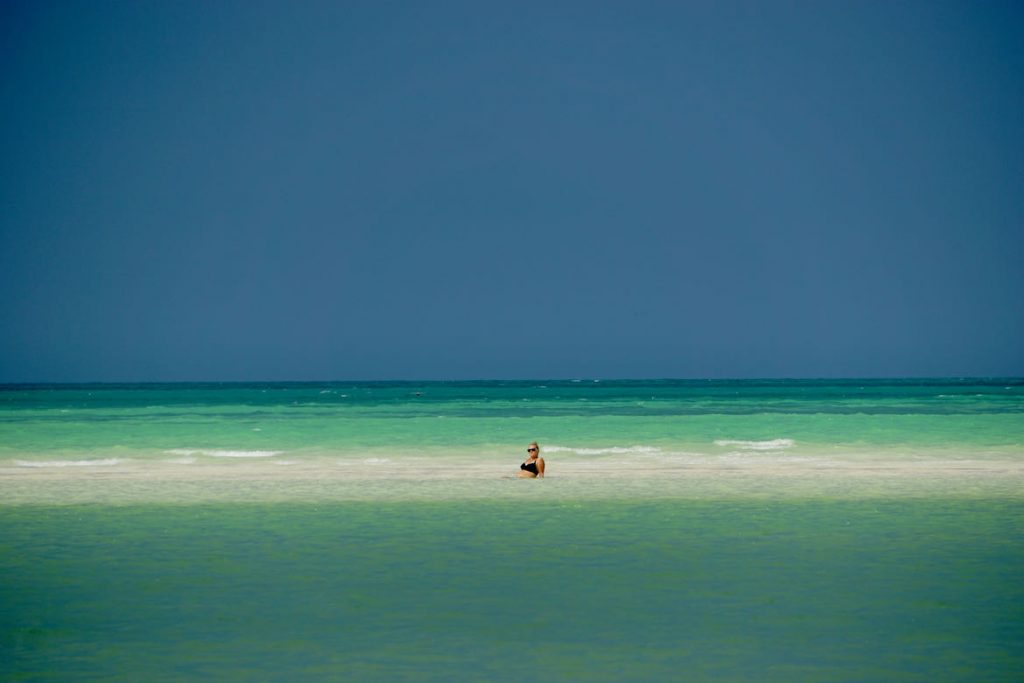
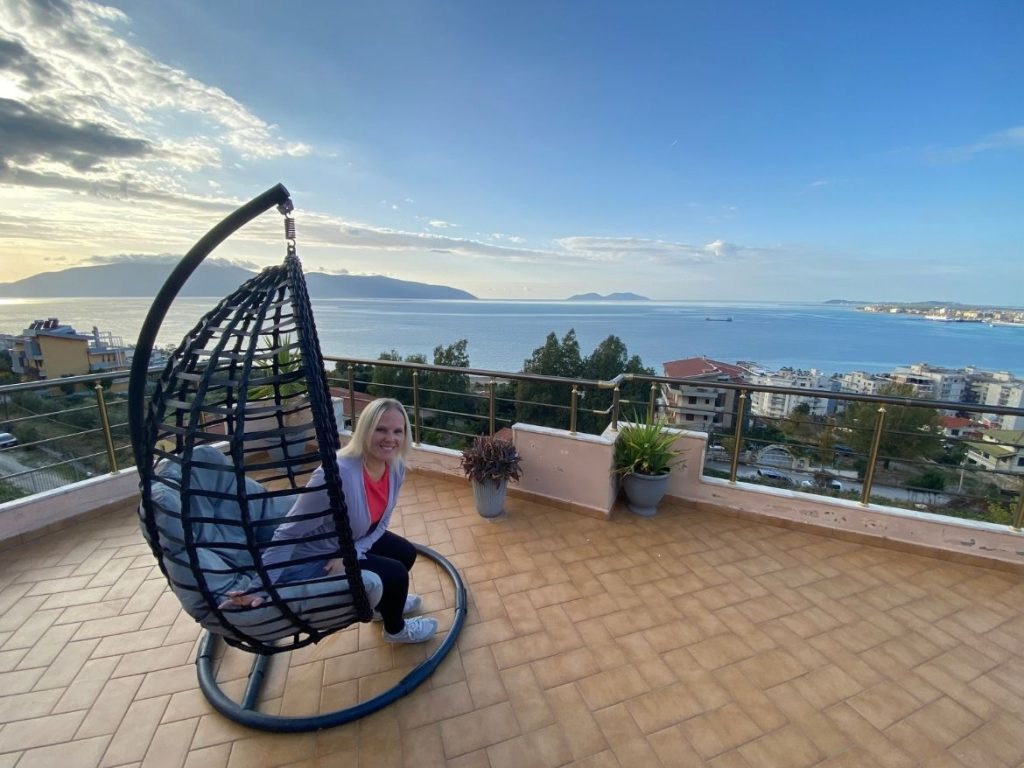
Hey Sasha thank you very much for the information! It contained very good information.
I am really interested in joining applying this year (2021) to Bali. I heard that you can apply to 2 universities maximum.
I would like to ask you some questions.
-when you ask said that you recommend 500 USD you meant stippend + 500 or 500 in total?
-Is it possible and safe to rent or buy a motorbike without license?
-What advice could you give to someone making his motivation letter to make it more powerful and interesting? specially for a popular place like Bali?
Sorry I find this information about 3 year later :/
Thank you and greetins from Colombia.
Regards,
Daniel
Hi Daniel! Thanks for the comment. The post is quite old but I’m glad it’s still useful! If you end up in Bali, I think the stipend plus $500 is enough to live comfortably enough. I’m not sure how much the stipend is these days but I think it has increased since I did the program 5 years ago. As for the motorbike, you should definitely have a license of some sort. I had my international driver’s license while there, but not an official motorcycle license. This caused me to have to pay a “fee” (aka a bribe) to police officers several times. It’s one of those things you have to deal with there. For your letter, I would stress how much you’re interested in Indonesian culture, specifically Balinese culture if you really want to live there. Give examples of what you will do to share your experience with friends and family. For me, that was writing blogs. I wish you the best of luck and hope you get in. It’s a great experience! Cheers, Sasha
Hi, Im Zhafir from Malaysia. Thank you so much for sharing your experience. I would love to apply the program this year but after reading your write, I think I need to work this year and save some money and apply it for next year. Im afraid that I don’t have an enough money when Im staying there. I have questions, can we choose which school and region that we want to go? Because I really want to go to Bali, so Im expecting to get to study in ISI Denpasar, Bali. Thank you so much !
Hi Zhafir, Thanks for your comment! Saving enough money for the program is definitely a concern. I believe the stipend has increased since I did the program and is now about $250 a month or so. You will need to have money saved to life comfortably, though. How much really depends on where you study and what your lifestyle is. You can choose ONE school you want to apply for specifically, or you can just apply to the program generally and see where they place you. If you only want to study in Bali and have no interest in Jakarta, Bandung, etc., you would just apply for ISI Denpasar and hope for the best. Hope that helps! Best of luck to you, Sasha
Hey Sacha,
It’s Naraw again, I posted a comment on your blog a while ago before starting the Darmasiswa program.. and now I am posting again from Lampung-Indonesia 🙂
Just wanted to let you and the other commentator Zhafir, know that the stipend money is enough for me here, as the university gives us accomodation for a very low price and there aren’t many things to do around here so we really dont have to spend much.. I am not living lavishly but comfortably ..I am sure it is different elsewhere but just wanted to share this, so that no one misses out if money is the only issue , cause it can be enough if you come with an open heart and mind Haha , but I also have to admit that I am kinda eating like a local and I dont go to Macdonalds or buy imported stuff all day.. there were a few times where I had to use some of my own money though, as I wasn’t given my stipend on time .
Oh and my advice to anyone thinking about this program, is to do their research really really well about the city and the university they choose , and to make sure it is what they are looking for, cause I’ve been to some cities and the difference in lifestyles is huge .
Thank you and have an awesome day
Hi, Naraw! Thanks for letting us know! That is really solid advice that will be useful for a lot of people. Cheers! ?
Thanks so much for sharing some light into this!
I am so grateful to have found your blog.
I am a Michigan native also, who chose ISI Denpasar as their home school for traditional dance.
I am extremely excited to be starting the program and hope to be able to make the best of it.
Could you share some light as to how you went about finding housing once you settled in Bali?
Any other logistical information would also be helpful!
Congratulations on getting accepted into ISI, Diego! That’s great news and you should be super excited to move there. As far as housing goes, I booked a studio on Airbnb for my first month, and then relied on Facebook groups for the other places I lived. You may want to consider living in Sanur, as it’s close to Denpasar and the beach. It would only be about a 20-minute motorbike ride to ISI from there. There’s a Facebook page called Sanur Community that should be helpful. Let me know if you have any other questions… always happy to help!
Hey Sasha,
Awesome post, It answered a lot of questions for me, I just got accepted in the Darmasiswa program for this year and I’m really excited but a bit worried as well, so I have a few questions and I would really appreciate if you could help
I’m going to study in Lampung , did you by any chance meet people who studied there or did you visit lampung yourself ?
Was the ( no traveling outside indonesia) rule strict?
One last question , for those who decided to leave did they have to pay renumeration or something ?
Thanks a bunchh
Hi Naraw, Thanks for your comment and congratulations on getting into the program! Unfortunately I never visited Sumatra while we lived in Indonesia. But we’re hoping to go next time! When I was there, the no travel outside of Indonesia was not really enforced. I never left in the school year but many of my classmates went home for Christmas or traveled to other countries in SE Asia. As far as paying renumeration, I don’t think anyone had to do that… but then I only knew a few people who left early. Hope that’s helpful! Enjoy your time in Indonesia – it’s an amazing country!
Wow, I had no idea such a program existed. This sounds like a really great chance to live in Indonesia for a year. As you said, it all depends on what you make of it, but I can see this being quite awesome.
It is a shame I already have plans for my next year, because this program sounds like a lot of fun. But first, I need to go home for a while, work and save some money. I loved reading about it, though. And who knows, maybe I will one day come back to your post and apply for that scholarship.
Thanks for the comment, Ilona! It really is an awesome program. I had a similar issue when I found out about it. My friend did the program for the 2012-13 school year and we went to visit, but I wasn’t able to apply until 2 years later. Definitely keep it in mind for next year, and feel free to reach out if you have any questions!